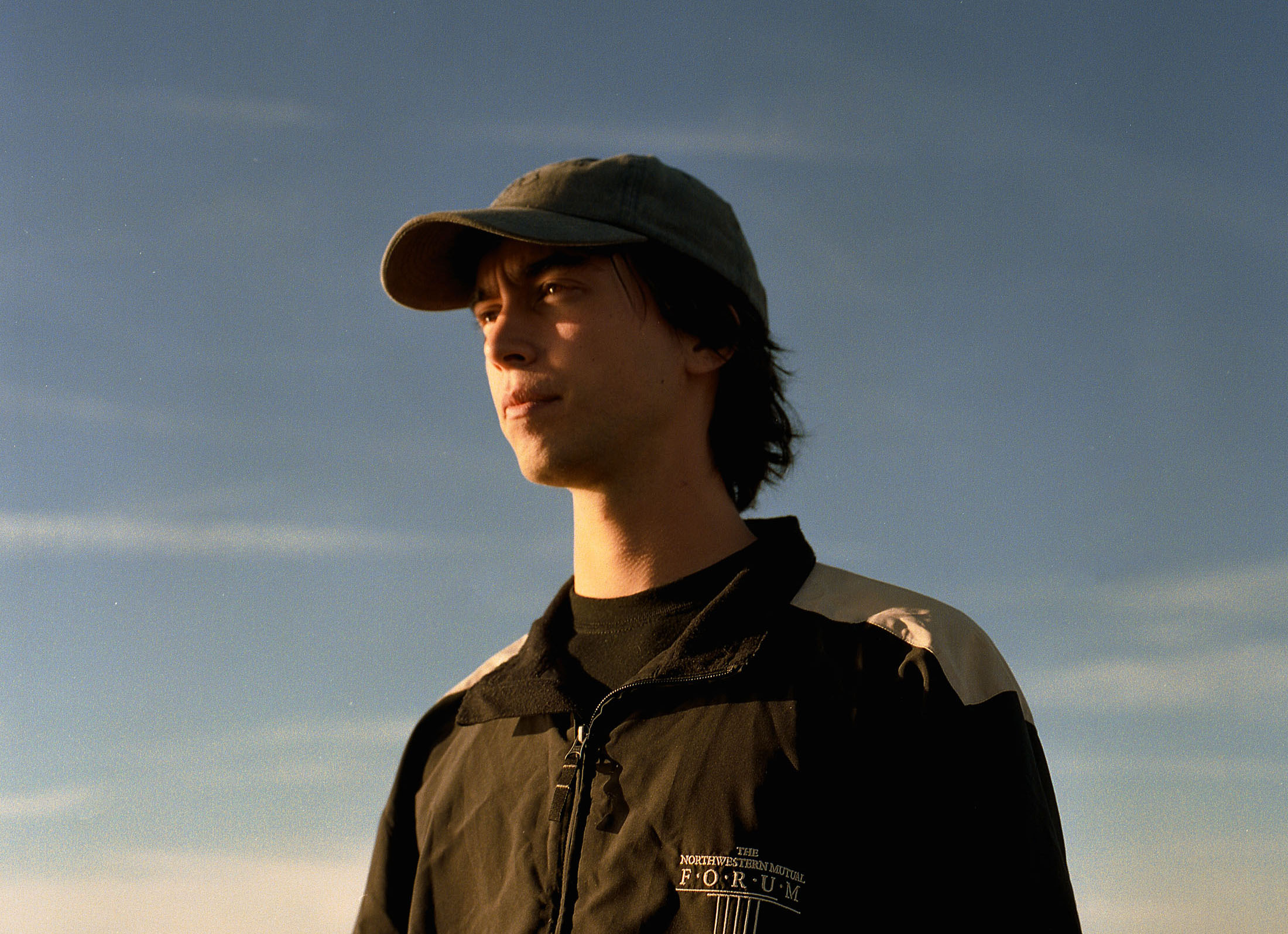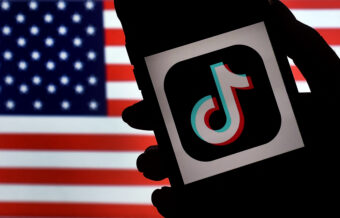By most accounts, Alex Giannascoli doesn’t look like a star. The baggy jeans and knotted mess of black hair have the makings of a greasy dishwasher or shabby art school dropout, not the internet’s so-called best-kept secret of songwriting. But the 24-year-old musician formerly known as Alex G reveals his magnetism the second he opens his mouth; he has an inescapable energy, and an endless need to rattle off elaborate explanations for track after track on his new album Rocket, easily the most hyped record of his still-young career.
“I gotta watch myself and not make claims about the scope of what I’m doing,” he says from the Greenpoint bar where we meet on an April afternoon, shaking his head as if this has happened before. “I’m trying to make songs that sound good and that people can relate to. I’m working song by song just to make something good.”
“Something good” might be a bit of an understatement. For the last six years, Giannascoli has uploaded his rough self-recordings to Bandcamp, attracting a passionate fanbase of young fans, winning acclaim from bedroom-rock forebearers like Coma Cinema and Teen Suicide, and found a place for himself on the Brooklyn imprint Orchid Tapes. With the help of a growing number of musicians surrounding the burgeoning scene at Philadelphia’s Temple University, he slowly turned the unassuming moniker into a sprawling force of squealing, sun-drenched experimental rock with his 2015 Domino debut Beach Music.
Since then, things have gotten complicated. Last year, Giannascoli received a mysterious email from R&B songsmith Frank Ocean requesting his presence on Endless and Blonde, two of 2016’s most acclaimed albums. Though he admits the guest features didn’t exactly launch him into R&B prestige, the tracks rumble with a lo-fi grit unimaginable from what years ago meant a John Mayer collaboration. “The thing about all that stuff too is that I don’t wanna give myself too much credit because I didn’t do that much,” Giannascoli says. “I’m so psyched that I’m involved, I don’t wanna act like I did something really life-changing. He just took the little pieces that worked for him and went with it.”
Humility aside, his inclusion still affirmed what kids on the internet had been screaming about for years now: that for all the oblique chords and off-kilter effects, nothing really feels quite like a Giannascoli production. The outsider appearance always masked tender, open-hearted pop sensibilities, and beneath each hook, a Rolodex of experimental sounds always gave way to a certain swathe of mellow, full-bodied bliss.
https://www.youtube.com/watch?v=gWH0jj0qiMg&feature=youtu.be
Beyond a shift in stylistic energy, Giannascoli was also forced to change his stage name. In December 2015, the Colorado-raised, Los Angeles-based musician Alexandra Gronlund filed a trademark for the name “Alex G,” which she has used on her YouTube channel since 2010. Though largely focused on covers of popular songs, the channel now has over a million subscribers, and Gronlund has gone on to collaborate with acts like Lauren Christy, Mikal Blue, and Jason Mraz.
With Gronlund now in possession of the name for all “entertainment services” spanning from live performances and streaming rights to the creation of fan clubs and online computer games with the name, Giannascoli is now going by (Sandy) Alex G. In a statement provided with the album’s third single “Proud,” his label shared: “Going forward, Alex G will be known as (Sandy) Alex G. We are unable to provide further comment at this time, but would appreciate you using the new titling for all future mentions.” (Gronlund did not reply to our e-mails.)
“‘Sandy’ was the first thing I put on Bandcamp, which was always ‘sandy.bandcamp.com,’” Giannascoli said. “Ever since then, I’ve just used that ‘Sandy’ as a sort of tag [on social media].” Even amongst all the legal hairsplitting, Rocket is an album still unafraid to take risks. Songs like “Proud” and “Bobby” reveal a new Appalachian influence, bending violin and banjo lines into reeling rounds with a distinct country drawl. After making the jump to the prestigious Domino Records, Giannascoli still does much of the recording himself with an old copy of “GarageBand 6.” The songwriter warps and pitch-shifts sounds beyond recognition, turning his flat vocals into unintelligible Autotune-drenched atmospheres. “Sportstar” has almost the edge of Frank Ocean’s “Nikes” as if sung from the bottom of the ocean, while “Country” blends the Rhodes-and-falsetto of labelmate Porches into a strange, almost-free-jazz jam.
Though Giannascoli has been compared to the roaring lo-fi legacies of Modest Mouse or Built to Spill, Rocket instead slows down, finding strength in heartfelt songwriting and the greater push toward an experimental unity. For every freewheeling “Horse” or “Brick,” there’s a track like “Judge,” which instead locks in on chorus-drenched guitar grooves that look back on the basement days of Rules or Trick. At the tail-end of one such eminently familiar riff (albeit layered with banjos and violins) on opener “Poison Root,” Giannascoli looks out toward the crowd with a tone that’s almost impossible to read. Repeated with the same menacing deadpan of Trick’s “Kute,” the songwriter plainly sings, “Now I know everything.” Maybe he’s onto something here.
There’s this song on the record called “Brick” that’s almost like noise, with you rapping. Where did that come from?
I think it’s really just the same place that the other stuff comes from. I’ll play something, and then it’ll remind me of something else and a song will come from it. It’s hard to explain. It’s not very interesting; I was messing around on the guitar, I guess. I just thought it sounded good like this, then I added some drum machine and then was like, “Oh, this sounds pretty cool.” Then I added some more distorted guitar and just sort of built on it.
Is that how songs tend to come together for you?
Absolutely. So for chord progressions, that’s all on the guitar. But as far as orchestration, that’s all from listening to what I just recorded and looping what sounds best. I’ll sort of hum something and then a word will come to sound right, and then I’ll build off of that. A little bit subconscious where I go with the first thing that springs up. After that, they just spill out and then I just string them together.
A lot of people on the internet seem to have this idea that you’re writing all these characters, like you have some grand narrative planned out.
Well, I do think about characters and stuff when I’m writing. It’s hard to talk about a big thing, because obviously I have an unrealistically big vision for what I’m making. There’s things about it to me that string it all together and there’s a narrative to me, but honestly when I talk about it, it’s just so pretentious. I think that there are all these basic characters and what ties them together is their own stupidity. But it’s not even that fleshed out, y’know? It’s just like my fraction of a thought at the beginning of each song, and then they just take their course each in their own way. This isn’t really even a big thing. Hopefully someone mistakes it for being a big masterpiece, but it’s not. [laughing]
There seems to an attempt at being vague, too. Do you try to keep it that way?
Yeah, totally. I think the best part about music is being able to sit with it. For the listener to be able to fucking feel it! That’s what I like.
What sort of stuff did you listen to growing up that did that for you?
Modest Mouse for sure, because their lyrics are just nonsense. But you’d just hear that line and [shouts] “Yeah!” And just be feeling it. I used to be so obsessed with Modest Mouse.
Isaac Brock does a really good job of associating words together that I don’t even know if he has anything in mind, but it just creates this weird picture at the end. I think your music sometimes does the same thing.
Yeah, I definitely am stealing that from him, because he does do that.
One thing that you probably get asked a lot is about the Frank Ocean collaboration. How did that come together?
He first hit me up through email and asked if I was interested. It was pretty vague; he would give me a vocal part and I would try to write stuff under it.
Were you in-person working with him?
He would come in and say, “Hi”, but then I’d be working with his pre-recorded stuff.
What was the vibe like?
It was just real pleasant. Everyone seemed really excited to be there. I think he got a lot of people that were really established to help work on it, but when I was there, I was with some people who are more like me, y’know? More honored to be there.
What kind of people were there? Any celebrities?
Not that I know of—just other music people that were trying to do their best work. It was cool to see everyone staying up all night, working really, really hard. It’s inspiring knowing how hard everyone worked, y’know?
Do you think you have any new fans from it?
I don’t know, because I mean I didn’t really do that much. Like who’s gonna listen to that album and be like, “Oh, this three seconds of guitar!”? The thing about this stuff is that I don’t wanna give myself too much credit because I didn’t do that much. I’m so psyched that I’m involved; I don’t wanna act like I did something really life-changing, y’know? He just took the little pieces that worked for him. It’s all him. I don’t know if anyone’s gonna hear that and be like, “This guy really did something here!”
Did you ever talk about why he liked your records?
We didn’t really talk about why I was there. I guess he must like something.
I remember awhile back, Philly.com said that you were really into James Joyce’s Portrait of the Artist as a Young Man. Do you do a lot of reading?
I do do a lot of reading [laughing]. That’s so funny though, I regret that so much of that because I was so pretentious. That was maybe the one hard book I ever read, and then I’m like, [sarcasm] “Oh, now this is what I’m about.” It’s so funny to think about some dude saying, “Oh, that’s my influence” and then you listen to my actual music and are like, “This dude is a fucking idiot [laughing]. No way did he actually ever get into this stuff.”
Are there any books you’ve been into recently that influenced the album?
I read Grapes of Wrath, I read East of Eden, I read Of Mice and Men, I was so psyched on America.
It kinda goes with the country thing, right?
Yeah, I didn’t wanna say that because I didn’t wanna be lame and be like, “Oh, yeah, I read this author, now I’m makin’ country music.” But maybe that fits. Blood Meridian, you ever read that? That’s what I read first and after that, I had to read another American thing. So that’s when I grabbed Grapes of Wrath. But Blood Meridian, that’s a fucking good book.
Do you think it found its way into Rocket at all?
I’m sure it did in whatever way my simple-ass brain interpreted it, but I don’t wanna say, “Oh, it was an influence” because those are masterpieces! And that would be crazy for me to, like—to try to make my own thing from that and to put it in a rock song? That’d be wack. But I did like them a lot, so I’m sure they’re in there somewhere.
What do you like about them?
I just like the story. I like how Blood Meridian was so dense and dark and almost like the real darkness wasn’t even the violence anymore. It was almost like there was something bigger that was even worse and then by the end of the book, you’re just like, “What the fuck!” That’s what I liked about that book. I think that’s what the statement was—you go through, and it’s like this incredibly violent story and then there’s like this even deeper evil where the violence is just something cast aside by the end. But I don’t know, I’m sure I’m missing some real big points.
Are you still based in Philly?
Yeah, I’m still there, just doing the same thing. In between going on tour.
Do you feel like a local celebrity at all?
No, thank God. I don’t get out that much, but I don’t feel like a local celebrity. I just hang with the same people, so it’s cool. I met a lot of people from playing shows around Temple, and then I moved kinda east so I don’t really hang around there very much. And I think all the students have sort of turned over by now.
Do you like touring at all?
I do. I like being on a schedule like that. You gotta here this day, here this day, etc. It just feels like you’ve got a purpose. Because it’s weird making your money on tour. When you come home and then you can just chill and not do anything for awhile. It’s weird feeling so aimless. It feels really good for a couple days and then it starts to eat your brain away.
Do you write on tour or write in that “aimlessness” period?
I don’t write on tour, but I think I’ve noted that once we get home, there’s like a week where I’m just like bursting with shit and then if we’re home for another week, I sorta get like settled down and turn into a lazy-ass. And then I’m pretty much a lazy-ass till we come out again. It’s weird, I think my brain needs to be coiled back and like [makes punching motion]. And then once it releases, it’s all gone.
Do you ever scribble out ideas or work them out on tour as you go? Or does it all just kinda subconsciously come out when you’re back?
I write a very few little notes in my phone, but mostly it just comes out when I’m back. It’s not even stuff that I’ve collected on tour or anything, I think it’s just the fact that I don’t get any free time on tour. And then when I have free time back, it’s just so easy to be productive. But then once I’m so rich with free time, I just abuse it.
I feel like Alex G is such like a Philly thing, you know? Do you think that the band could have ever happened in Brooklyn or in some other city, maybe one without house shows or a DIY scene?
Yeah, we played so many house shows that it’s hard to imagine what my perspective on music would be without that. I like music, I feel like it’s in my blood to like music, so I probably would’ve done something, but it definitely wouldn’t have been the same. Maybe I would just know how to use better equipment or something, I don’t know. Would’ve gotten a better day job or something instead of trucking around playing shows all the time.
I think building an audience with DIY is important and house shows definitely help with that. There’s like so many people up here that do music school, but then nobody cares about their actual music.
Exactly. Playing house shows, you’re right there. Obviously there’s no money involved, but you’re like talking to people after the show, and like, “Yo, that was awesome!” or, “Yo, that sucked, don’t do that anymore!” and it’s this whole training camp for how to make music. Not that it has to be that, but it’s just so rewarding. It’s crazy how rewarding it is.
https://embed.spotify.com/?uri=spotify%3Aalbum%3A5Pq92omNLyQgGGrj2u4pur





